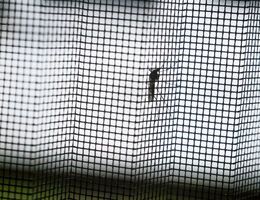Health library
Back to health libraryWhat to know about 3 mosquito-borne diseases

Sept. 11, 2024—Mosquitoes aren't just annoying. They can be dangerous disease carriers. In fact, the Centers for Disease Control and Prevention (CDC) calls them the world's deadliest animal.
Why? Female mosquitoes eat blood. If they bite a person or an animal that has germs in their bloodstream, those germs can spread to the mosquito. Sometimes, that's the end of the story. Not all mosquitoes spread diseases that affect humans. And not all diseases can spread through a mosquito bite.
But some germs can grow inside the mosquito, spreading to its salivary glands. After that, the mosquito can spread the germs as it feeds.
Here's what to know about three mosquito-borne illnesses you might have seen in the news recently—and what people in the United States need to know about them.
West Nile virus
West Nile virus is the most common disease spread by mosquitoes in the U.S. But it's hard to know how many people have had it, because most people who become infected don't have symptoms.
About 1 in 5 people with West Nile experience body aches, headache, fever, rash, vomiting and diarrhea. In rare cases, the virus affects the brain or spine. That happens to about 1 in 150 people who get West Nile. Of those, about 1 in 10 die.
Where it spreads: West Nile virus is found throughout the continental U.S.
Dengue
Dengue is the most common mosquito-borne illness in the world, CDC reports. It infects up to 400 million people worldwide every year. About 1 in 4 people who get dengue have symptoms, such as fever, pain behind the eyes, body aches, nausea, vomiting and rash. Most of the time, people recover after about seven days. About 1 in 20 people with dengue develop severe illness, which can lead to death.
Where it spreads: Dengue is most common in tropical or subtropical areas, and most cases in the continental U.S. are linked to travel.
Dengue is common in some U.S. territories, including Puerto Rico, which had a serious outbreak in 2024. And local spread has been detected in Arizona, California, Florida, Hawaii and Texas, reports CDC.
Eastern equine encephalitis
Only a few cases of Eastern equine encephalitis, a rare but serious disease, are reported in the U.S. each year, usually in Eastern states. Symptoms include changes in behavior, drowsiness, seizures, fever, headache, diarrhea and vomiting. About 30% of people who are infected with it die. Survivors may experience lasting nervous system problems.
Where it spreads: The disease is very rare in the U.S. But when cases do occur, they're usually in the Eastern or Gulf Coast states.
Protect yourself
Mosquito-borne illnesses often don't have specific vaccines or treatments. The best way to avoid becoming infected with a mosquito-borne illness is to prevent bites, says CDC. Our guide to surviving mosquito season offers useful tips for protecting yourself.
Sources
- Centers for Disease Control and Prevention. "About Dengue." https://www.cdc.gov/dengue/about/index.html.
- Centers for Disease Control and Prevention. "About Eastern Equine Encephalitis." https://www.cdc.gov/eastern-equine-encephalitis/about/index.html.
- Centers for Disease Control and Prevention. "About Mosquito Bites." https://www.cdc.gov/mosquitoes/about/about-mosquito-bites.html.
- Centers for Disease Control and Prevention. "About Mosquitoes in the United States." https://www.cdc.gov/mosquitoes/about/about-mosquitoes-in-the-united-states.html.
- Centers for Disease Control and Prevention. "About West Nile." https://www.cdc.gov/west-nile-virus/about/index.html.
- Centers for Disease Control and Prevention. "About Zika." https://www.cdc.gov/zika/about/index.html.
- Centers for Disease Control and Prevention. "Current Dengue Outbreak." https://www.cdc.gov/dengue/outbreaks/2024/index.html.
- Centers for Disease Control and Prevention. "Data and Maps for West Nile." https://www.cdc.gov/west-nile-virus/data-maps/index.html.
- Centers for Disease Control and Prevention. "Data and Statistics on Dengue in the United States." https://www.cdc.gov/dengue/data-research/facts-stats/index.html.
- Centers for Disease Control and Prevention. "Fighting the World's Deadliest Animal." https://www.cdc.gov/global-health/impact/fighting-the-worlds-deadliest-animal.html.
- Centers for Disease Control and Prevention. "Symptoms of Dengue and Testing." https://www.cdc.gov/dengue/signs-symptoms/index.html.
- Centers for Disease Control and Prevention. "West Nile: Symptoms, Diagnosis, & Treatment." https://www.cdc.gov/west-nile-virus/symptoms-diagnosis-treatment/index.html.
